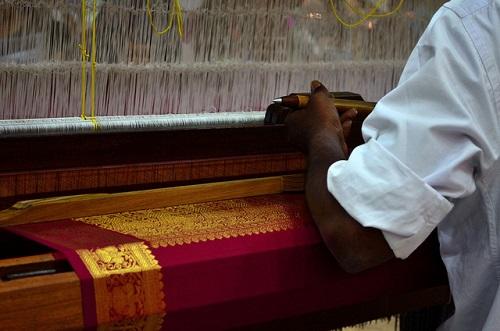Coimbatore: Fifty-year-old T Kumar and his wife K Saroja have been weaving handloom saris for the past 25 years. Though the income is limited, they stuck to the ancestral trade, making do with what they earned by weaving around three saris a week at their home in Negamam, Pollachi. But the pandemic has hit them hard this time. For almost three weeks now, the couple have been without work.
With no source of income, they are completely dependent on the state government’s Covid-19 cash relief and ration products for their survival. Kumar, a father of two, said, “Around the same time last year, as the government had announced some lockdown relaxations, my wife and I had been doing odd jobs, working in a poultry farm, at a construction site and at a garment factory. As a complete lockdown was imposed this time, we could not get any kind of work.”
Kumar, who is looking for odd jobs, is unsure if he can continue with his traditional weaving work. The economic after effect of the pandemic has changed the future of his family. His daughter is in Class XII, but as the family is unable to pay her academic expenses, Kumar has been forced to ask her to take a break from her studies for a year.
General secretary of the Coimbatore district handloom weavers’ association E N Rajagopal, said this is the condition of most weavers in the district. “Most of us are dependent on the traders. As all the shops are shut and business has taken a huge hit, we are not getting any orders,” he said.
As the cost to procure raw material like thread and zari is high, the weaver used to get them from traders and handover the final product after obtaining weaving charges. Depending upon the design, their wage would vary from `500 to `1,000 for a sari.
Thousands of weavers are functioning from several parts of Coimbatore district including Sirumugai, Ondipudur, Negamam, Annur and Vellalore. “Traders continued to give us orders even after one week into the lockdown. But as the saris could not be sold, and so the payment had stopped and then the orders dried up,” said Kumar.
There is also a shortage of raw material such as zari and silk that would be purchased from other states due to lockdown rules in different states. “While some have obtained loans, others have pledged their assets to meet the expenses. What other option do we have?” said Rajagopal.
Handloom, already faces stiff competition from powerlooms, involves investment of capital and resources, both of which are scarce during the pandemic. In this situation, the handloom weavers can survive only with the state’s help, feels P Parameshwaran, president of the handloom weavers’ association. “The financial assistance of `4,000 is not sufficient. We request the government to take necessary steps to ensure uninterrupted supply of raw material to us,” he said.
Source : Times of India

